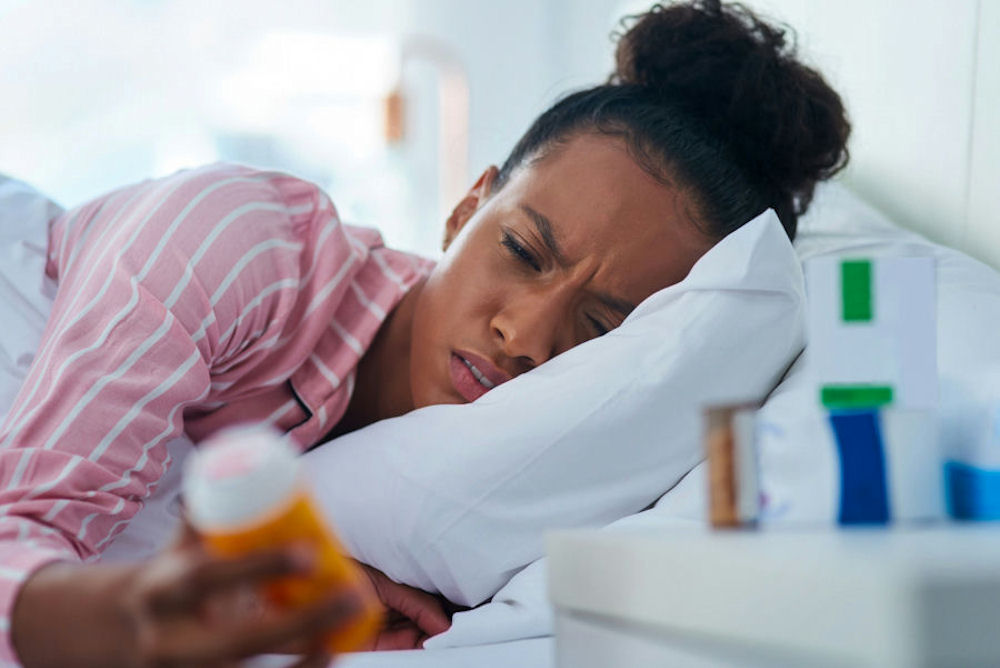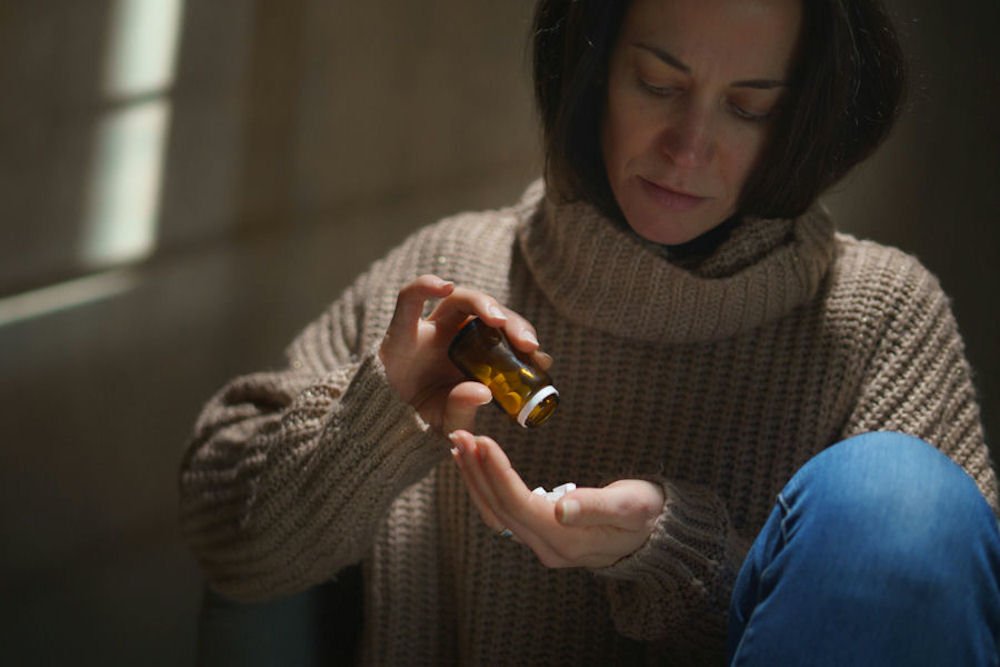Accutane is a powerful medication often prescribed to treat severe acne. However, there is much confusion surrounding whether it is safe to consume alcohol while taking this medication. Most prescription medications do interact with alcohol. In fact, most over-the-counter medications interact with alcohol. It’s a good best practice to determine if any medications you’re taking interact with alcohol if you believe there is a chance you could be drinking on them.
Since Accutane is a widely prescribed medication, it’s a commonly asked question whether it’s safe to drink alcohol while taking this medication. We will delve into the details of Accutane, its uses, the science behind its interaction with alcohol, potential risks and side effects, medical opinions, and safe practices for users.
Understanding Accutane and Its Uses
Jump to Section
Accutane, also known as isotretinoin, is a medication derived from Vitamin A, primarily used to treat severe nodular acne that has not responded well to other treatments. It is highly effective in reducing oil production, preventing clogged pores, and reducing inflammation associated with acne.
Accutane is a powerful medication that requires close monitoring by a healthcare provider due to its potential side effects. Regular blood tests are often necessary to monitor liver function, and cholesterol levels, and to ensure that the drug is not causing any adverse effects on the body.
What is Accutane?
Accutane is an oral medication and works by targeting the root causes of acne. It reduces sebum production, a type of oil that lubricates the skin and inhibits the growth of acne-causing bacteria. Additionally, it prevents the formation of new acne lesions and reduces inflammation.
It is important for individuals taking Accutane to avoid vitamin A supplements, as this can lead to vitamin A toxicity due to the high levels of the vitamin in the medication. Pregnant women or those trying to conceive should not take Accutane, as it is known to cause severe birth defects.
The Role of Accutane in Acne Treatment
Accutane is often prescribed when other treatments, such as antibiotics or topical creams, have been ineffective. It is reserved for cases of severe acne that can cause physical and emotional distress to the individual. Most dermatologists recommend Accutane as a last-resort treatment due to its potent effects.
Side Effects of Taking Accutane
Accutane can have a range of side effects, some of which can be quite serious. Common side effects include dry skin, lips, and eyes, as well as increased sensitivity to the sun. More severe side effects can include:
- Birth Defects: Accutane can cause severe birth defects if taken during pregnancy, so it’s crucial for women to use effective birth control while on the medication.
- Mental Health Issues: Some people may experience depression, anxiety, or mood changes.
- Liver Damage: Regular blood tests are often required to monitor liver function.
- Increased Cholesterol and Triglycerides: Blood tests are also used to monitor these levels.
- Bone and Muscle Pain: Some users report joint and muscle pain.
- Vision and Hearing Changes: Rarely, it can affect vision or hearing.
- Gastrointestinal Issues: There can be an increased risk of inflammatory bowel disease.
Due to these potential side effects, Accutane is usually prescribed only after other acne treatments have failed, and under strict medical supervision.
The Science Behind Accutane and Alcohol Interaction
While Accutane is known for its effectiveness in treating acne, the interaction between Accutane and alcohol has been a subject of debate. To understand this interaction, let’s delve into how Accutane works in the body and the effects of alcohol on its metabolism.
Accutane, a derivative of vitamin A, belongs to a class of medications called retinoids. It exerts its therapeutic effects by targeting multiple factors involved in acne development. By modulating gene expression and cellular differentiation, Accutane reduces the size and secretion of oil glands, decreases inflammation, and inhibits the growth of acne-causing bacteria. These complex mechanisms make Accutane a potent treatment for severe and persistent acne, especially when other therapies have failed to provide relief.
How Accutane Works in the Body
Accutane works by altering the activity of the oil glands, reducing sebum production, and shrinking the sebaceous (oil-producing) glands themselves. It also influences the rate of skin cell turnover, preventing clogged pores and the formation of new acne lesions. These systemic effects make Accutane highly effective but also pose potential risks.
Despite its efficacy, Accutane is not without side effects. Common adverse reactions include dry skin, lips, and eyes, as well as muscle aches and increased sensitivity to sunlight. In rare cases, Accutane has been associated with severe conditions like inflammatory bowel disease and depression. Due to these risks, Accutane is typically prescribed under close medical supervision, with regular monitoring to ensure patient safety.
The Effects of Alcohol on Accutane
Alcohol is metabolized by the liver, and Accutane is also extensively metabolized in the liver. Consuming alcohol while taking Accutane puts additional strain on the liver, which can potentially lead to liver damage. Furthermore, alcohol can enhance the risk of certain side effects associated with Accutane, such as dizziness, drowsiness, and impaired judgment. Free by the Sea can assist with alcohol addiction treatment in Ocean Park, Washington.
It is crucial for individuals undergoing Accutane treatment to follow their healthcare provider’s guidance regarding alcohol consumption. Limiting or avoiding alcohol can help reduce the burden on the liver and minimize the potential for adverse effects. Patients should also be aware of the signs of liver dysfunction, such as abdominal pain, jaundice, and unusual fatigue, and promptly report any concerning symptoms to their healthcare team. By understanding the intricate relationship between Accutane, alcohol, and liver function, individuals can make informed choices to support their health and well-being.
Potential Risks and Side Effects of Mixing Accutane and Alcohol

Combining Accutane and alcohol can lead to potentially harmful short-term and long-term side effects. It is vital to be aware of these risks before making a decision regarding alcohol consumption while on Accutane.
Accutane, a powerful medication used to treat severe acne, is known to have a range of side effects on its own. When combined with alcohol, these side effects can be exacerbated, posing a greater risk to the individual’s health.
Short-term Side Effects
Combining Accutane with alcohol can increase the risk of certain side effects, particularly those related to the liver and mental health. Short-term side effects of this combination may include:
- Increased Liver Strain: Both Accutane and alcohol can affect liver function, so using them together can put additional strain on the liver, potentially leading to liver damage.
- Dehydration: Both substances can cause dehydration, which may exacerbate side effects like dry skin and lips.
- Dizziness and Drowsiness: Alcohol can enhance these effects, making it unsafe to drive or operate machinery.
- Mood Changes: Alcohol can amplify mood swings or depression, which are potential side effects of Accutane.
- Gastrointestinal Issues: There may be an increased risk of stomach upset or gastrointestinal discomfort.
It’s important to remember the interaction between Accutane and alcohol can lead to an increased risk of accidents and injuries due to impaired coordination and judgment. It is essential to exercise caution and avoid activities that require mental alertness when consuming alcohol while on Accutane.
Long-term Side Effects
Combining Accutane and alcohol over the long term can lead to several serious health issues, primarily due to the increased strain on the liver and potential exacerbation of other side effects. Here are some potential long-term effects:
- Liver Damage: Both Accutane and alcohol can be taxing on the liver. Long-term use together can significantly increase the risk of liver damage or liver disease.
- Increased Cholesterol and Triglycerides: Accutane can raise cholesterol and triglyceride levels, and alcohol can exacerbate this effect, potentially leading to cardiovascular issues over time.
- Mental Health Concerns: Long-term use of both substances can contribute to mental health issues such as depression or anxiety, with alcohol potentially worsening these conditions.
- Bone Health: Accutane can affect bone density, and excessive alcohol consumption can also weaken bones, increasing the risk of fractures.
- Gastrointestinal Problems: Chronic use of both can lead to gastrointestinal issues, including an increased risk of developing conditions like pancreatitis.
Due to these potential risks, it’s important to discuss alcohol use with a healthcare provider when taking Accutane to ensure safe and effective treatment.
Medical Opinions on Accutane and Alcohol Consumption
Various medical professionals, such as dermatologists and general practitioners, have differing perspectives on the consumption of alcohol while undergoing Accutane treatment. Let’s explore their viewpoints to gain a well-rounded understanding.
Dermatologists' Perspective
Dermatologists generally advise against consuming alcohol while on Accutane due to the potential risks and side effects mentioned earlier. They emphasize the importance of allowing the liver to focus solely on metabolizing Accutane and keeping it free from additional stressors, such as alcohol.
Furthermore, dermatologists highlight the fact that Accutane itself can already put a strain on the liver, as it is a medication that requires close monitoring of liver function tests throughout the treatment period. Adding alcohol to the mix can potentially exacerbate any liver issues and compromise the effectiveness of the treatment.
General Practitioners' Views
General practitioners often share similar concerns regarding the potential risks of combining Accutane and alcohol. They stress the importance of maintaining overall liver health and urge patients to prioritize their well-being by abstaining from alcohol consumption during the Accutane treatment period.
Moreover, general practitioners also take into account the mental health aspect of the situation, as alcohol can interact with Accutane and potentially worsen any mood-related side effects that some patients may experience while on the medication. By avoiding alcohol, patients can better monitor their mental well-being and ensure a smoother treatment journey.
Safe Practices While Using Accutane

When using Accutane, it’s important to follow certain safety practices to minimize risks and ensure effective treatment. Here are some general guidelines:
- Follow Prescriptions Carefully: Take Accutane exactly as prescribed by your healthcare provider. Do not adjust the dosage without consulting them.
- Regular Monitoring: Attend all scheduled appointments for blood tests to monitor liver function, cholesterol levels, and other health indicators.
- Use Effective Birth Control: If you’re female and of childbearing age, use two forms of birth control to prevent pregnancy, as Accutane can cause severe birth defects.
- Avoid Alcohol: Limit or avoid alcohol consumption to reduce the risk of liver damage and other side effects.
- Protect Your Skin: Use sunscreen and protective clothing, as Accutane increases sensitivity to the sun.
- Moisturize: Use lip balm and moisturizers to manage dry skin and lips, common side effects of Accutane.
- Monitor Mental Health: Be aware of any changes in mood or mental health, and report these to your healthcare provider immediately.
- Avoid Vitamin A Supplements: Accutane is a derivative of vitamin A, so taking additional supplements can increase the risk of toxicity.
- Stay Hydrated: Drink plenty of water to help manage dryness and support overall health.
By adhering to these practices and maintaining open communication with your healthcare provider, you can help ensure a safer experience while using Accutane.
Dosage and Timing Considerations
It is crucial to adhere to the prescribed dosage and timing of Accutane strictly. By following the recommended regimen, individuals can optimize the effectiveness of the medication and mitigate potential risks associated with alcohol interaction.
Accutane is typically taken orally in pill form, with dosages varying depending on the severity of the acne and the individual’s response to the treatment. It is important not to alter the dosage or frequency of administration without consulting a healthcare provider, as this can lead to suboptimal results or increased risk of side effects.
Do You Have More Questions Regarding Alcohol and Prescription Drug Interactions?
While Accutane can be highly effective in treating severe acne, it is essential to prioritize one’s health and well-being by refraining from alcohol consumption during the treatment period. The potential risks and side effects associated with mixing Accutane and alcohol should not be taken lightly. It is advisable to consult with a healthcare professional and follow their recommendations to ensure safe and successful acne treatment with Accutane. Individuals struggling with substance use may also benefit from professional depressant abuse treatment washington to address co-occurring risks and support overall health.
If you are concerned about your or a loved one’s drinking and how it may be interacting with prescription medications, please reach out to Free by the Sea today! We are here to help individuals overcome alcohol use issues.

Dr. Richard Crabbe joined our team in 2019 as our psychiatrist and medical director. He attended the University of Ghana Medical School where he became a Medical Doctor in 1977. From 1978 through 1984, he was a medical officer in the Ghana Navy and provided a variety of services from general medicine to surgeries. He received his Certificate in General Psychology from the American Board of Psychology and Neurology in 2002.

 September 4th, 2024
September 4th, 2024










